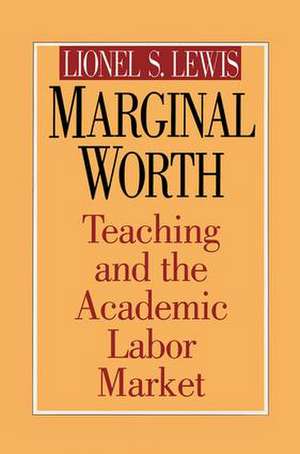Marginal Worth
Autor Lionel S. Lewisen Limba Engleză Paperback – 15 mar 2018
The evidence collected and analyzed by Lewis suggests that this is the case because teaching is not a particularly productive activity, and its quality is hard to measure. Teaching does not generate automatic prestige, most students do not learn a great deal, and in many instances other matters absorb the attention of faculty. Fifteen anonymous academic administrators and faculty members from around the country provided Lewis with the many letters, reports, and other documents he used in his analysis. By examining the material justifying merit salary awards, he reveals how merit is defined in academia. The focus of the letters is on teaching, research, administration, and service; teaching is not always seen as central to the academic role.
For several years and from all sides, American institutions of higher learning have been called to account for a variety of failures. Significantly, the one indictment most often heard is that classrooms have been abandoned for laboratories and libraries, where faculty pursue interests to further their careers. Lewis argues that restoring the balance between teaching and research is too simple a solution to the problem. We need to better understand how disciplinary and institutional reward structures affect teaching, how and why faculty allocate their tune, and why teaching appears to be neglected and underappreciated. Lewis applies tenets of the neoclassical labor market model to the academy, and considers what might be done to strike a better balance between expectations and circumstances in the academic marketplace. This candid look into the political economy of higher education will be enlightening reading for all concerned with the future of American higher education: professors, administrators, students, and parents.
Preț: 290.00 lei
Preț vechi: 332.51 lei
-13% Nou
Puncte Express: 435
Preț estimativ în valută:
55.49€ • 59.34$ • 46.27£
55.49€ • 59.34$ • 46.27£
Carte tipărită la comandă
Livrare economică 18 aprilie-02 mai
Preluare comenzi: 021 569.72.76
Specificații
ISBN-13: 9781138511880
ISBN-10: 1138511889
Pagini: 162
Dimensiuni: 152 x 229 mm
Greutate: 0.31 kg
Ediția:1
Editura: Taylor & Francis
Colecția Routledge
Locul publicării:Oxford, United Kingdom
ISBN-10: 1138511889
Pagini: 162
Dimensiuni: 152 x 229 mm
Greutate: 0.31 kg
Ediția:1
Editura: Taylor & Francis
Colecția Routledge
Locul publicării:Oxford, United Kingdom
Cuprins
Acknowledgments
1. Introduction
2. The Neoclassical Labor Market Model and the Academic Marketplace
3. Academics as Teachers
4. Factors Affecting Rewards in Academia
5. The Evaluation of Teaching and Research
6. The Concerns of Faculty
7. Defining Merit
8. What Colleagues Say about Colleagues
9. The Academic Labor Market in Action
10. The Administrative Response
11. Conclusions
Index
1. Introduction
2. The Neoclassical Labor Market Model and the Academic Marketplace
3. Academics as Teachers
4. Factors Affecting Rewards in Academia
5. The Evaluation of Teaching and Research
6. The Concerns of Faculty
7. Defining Merit
8. What Colleagues Say about Colleagues
9. The Academic Labor Market in Action
10. The Administrative Response
11. Conclusions
Index
Descriere
In the American university system for most of this century, the academic reward system has been blamed for both the neglect of teaching and a glut of uninspiring research
